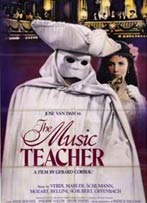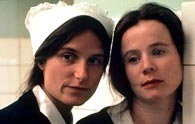
contact the culprit:
acid42@yahoo.com |
 WORLD
SPICE WORLD
SPICE
Tired of Hollywood and Cable TV? Let the Cine Europa Filmfest Inject Some
Flavor Into Your Viewing.
by Lionel Valdellon
published in The Manila Times : September 1998
It is one thing to watch testosterone-driven, wise-cracking men blow up
a renegade asteroid in a film where dialogue is made inaudible by sound
effects, and it is quite another seeing a mother and her pre-teen children
till farmlands for an abusive father, in a movie where every smile is
a victory against despair. While it's true both are entertaining, emotion-packed
and have equal claim to the silver screen, one reeks of commercialism
and the other smells more like art. If you enjoy films of this type---the
kind that treats the viewer as an intelligent human rather than a roller-coaster
patron---then there is reason to celebrate.
Cine Europa is an ongoing film festival sponsored by the European
Union (EU) at the Shangri-La Plaza Mall's The Cinema, that runs from September
3 to 13. The festival showcases 11 critically-acclaimed films from 10
EU member states: The Music Teacher (Belgium), Daens (Belgium), Breaking
The Waves (Denmark), Good Deeds (Finland), Will There Be Snow For Christmas?
(France), Beyond Silence (Germany), Pizzicata (Italy), Character (The
Netherlands), La Flor De Mi Secreto (Spain), House Of Angels-The Second
Summer (Sweden) and The Wings Of The Dove (United Kingdom). And the best
part? Free admission for all with daily screenings at 2:00, 5:00 and 8:00
p.m.
Cine Europa is unified Europe's first combined cultural and informational
activity in the Philippines, and was launched with a gala night last September
3. Ambassadors and representatives of the EU were present, as were members
of the press and distinguished guests. There were cocktails and a hearty
amount of Asti Cinzano before the initial screenings of Daens and The
Music Teacher.
After seeing too many American romantic comedies and big-budget action
flicks, this festival comes like a breath of fresh air. First off, most
all of these films have garnered awards from around the globe. Then of
course there are the different ways European film-makers approach the
onscreen narrative. Take a peek at the first four films the festival is
showing.
Breaking The Waves is the juggernaut of the four. At a hefty two
hours and thirty-eight minutes, it's no joking matter---literally and
figuratively. The movie is about Bess, a simple, pious small-town girl
and Jan, the outsider she marries. They're in love, Bess discovers the
pleasures of sex. However, a work-related accident paralyzes Jan from
the neck down and nothing is the same again. As his condition worsens,
Jan convinces Bess to have sex with other men. At first she cannot. But
because her forays coincide with Jan's health improvements, Bess starts
to believe she is actually helping Jan recover. Soon Bess' church excommunicates
her, Bess' mother shuts her out, and the town doctor is convinced she
should be admitted to a mental institution. Can a simple girl's faith
truly move mountains?
 ___This
film, directed by Lars Von Trier, is the 1996 winner of the Cannes Film
Festival Grand Prix. And it's worth every stirring minute. Shot using
the "MTV/I'm-Using-A-Handicam" approach, the images come at
a quick and disjointed rate, cutting back and forth between characters.
It adds to the raw, untamed ambience of the film's setting. But the real
lynchpin is actress Emily Watson's performance as Bess because it is she
who draws you in from casual observer to involved participant. You are
forced to choose between Bess' faith or the town's facts. ___This
film, directed by Lars Von Trier, is the 1996 winner of the Cannes Film
Festival Grand Prix. And it's worth every stirring minute. Shot using
the "MTV/I'm-Using-A-Handicam" approach, the images come at
a quick and disjointed rate, cutting back and forth between characters.
It adds to the raw, untamed ambience of the film's setting. But the real
lynchpin is actress Emily Watson's performance as Bess because it is she
who draws you in from casual observer to involved participant. You are
forced to choose between Bess' faith or the town's facts.
The Music Teacher, a 1988 film by Gerard Corbiau, is set to a
stirring soundtrack of operatic arias from the likes of Puccini, Wagner,
and Mozart. Here, a famous and successful opera singer named Joachim Dallayrac
retires, much to the surprise and dismay of his audience. Dallayrac moves
back to his estate with his accompanist and companion Estelle and a single
protégé named Sophie. Along the way, he finds a thief named
Jean whom the maestro feels can become a world-class tenor. Dallayrac
instructs them, seeking to perfect their unpolished talent. When a singing
contest sponsored by Dallayrac's old rival is announced, Jean and Sophie
must go without the support of their teacher. Are they truly ready?
___The screen becomes a canvas for director Corbiau's delicate portrait
of the music teacher in a tale about loving and letting go. Once again,
the action is more internal than external, the plot a mere outline on
which to hinge the characters' engaging personalities. Additional highlights:
the lush Belgian landscapes and the dialogue that approaches poetry.
Then of course you have a movie like Good Deeds. It's an entertaining
romp through Helsinki, Finland with two best friends, Sanna and Heidi,
who intend to play good samaritan matchmakers with a sad old man they
meet in an unemployment line. The duo enlist the aid of a postman named
Risto in their mission to spread a little happiness. But as their plan
starts to come apart at the seams and their friendship is tested, the
girls bring about some painful confrontations. In the end they realize
how they've overlooked sharing happiness with the people closest to them---those
who most need their attention.
___This one has the words "romantic comedy" tattooed to itself
in neon colors. And yet, despite the typical predicaments the characters
fall into, the movie possesses a charm all its own brought about by the
giggly, naïve heroines (played by Kaisu Kurla and Elins Knihtila).
Will There Be Snow For Christmas? is a simple enough story. A
mother and her seven young children tend a large vegetable farm in France.
The father is an abusive, egotistic man who cares more for his crops and
profits than his family. It turns out later on in the film that the father
has another "official" family elsewhere, and that the protagonists
are illegitimate (which explains the children's hostility). Despite a
harsh life of farm work and an absence of indoor plumbing and heating
in their small house, the mother is single-handedly able to create a home
filled with laughter and simple joy.
___Director Sandrine Veysset tells the story by showing the family's daily
chores and not much more, with the camera following along almost in real
time. No fancy plots. By the end of the movie, nothing is truly resolved.
But along the way you are caught up in the drama of their daily struggles
and realize what a significant symbol snow becomes to a family tied as
much to the land as to their father.
For a complete and updated schedule of screenings, please call 633-4491
or visit the Web site at www.shangrila-plaza.com. MTRCB Film Classifications
may be confirmed at the ticket office.
BACK TO TOP
|

 WORLD
SPICE
WORLD
SPICE  ___This
film, directed by Lars Von Trier, is the 1996 winner of the Cannes Film
Festival Grand Prix. And it's worth every stirring minute. Shot using
the "MTV/I'm-Using-A-Handicam" approach, the images come at
a quick and disjointed rate, cutting back and forth between characters.
It adds to the raw, untamed ambience of the film's setting. But the real
lynchpin is actress Emily Watson's performance as Bess because it is she
who draws you in from casual observer to involved participant. You are
forced to choose between Bess' faith or the town's facts.
___This
film, directed by Lars Von Trier, is the 1996 winner of the Cannes Film
Festival Grand Prix. And it's worth every stirring minute. Shot using
the "MTV/I'm-Using-A-Handicam" approach, the images come at
a quick and disjointed rate, cutting back and forth between characters.
It adds to the raw, untamed ambience of the film's setting. But the real
lynchpin is actress Emily Watson's performance as Bess because it is she
who draws you in from casual observer to involved participant. You are
forced to choose between Bess' faith or the town's facts.